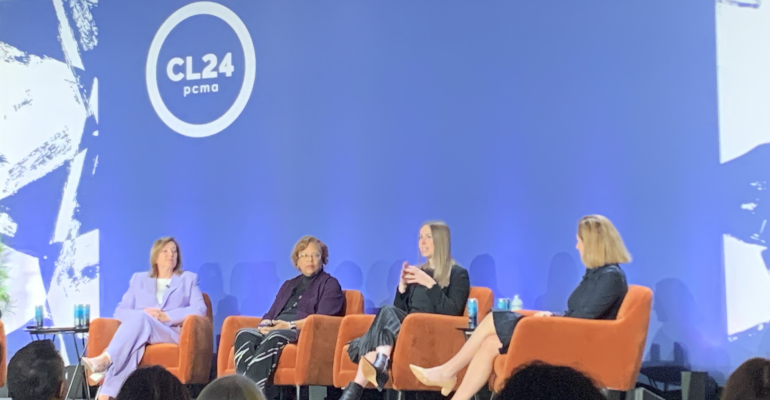When it comes to professional growth and career advancement, do you know the difference between a mentor and a sponsor? It’s an important distinction, and one that could affect how quickly you are promoted to being a departmental manager or an executive.
That was one key point made during a recent panel discussion among female leaders in the business-events niche. The session, titled “Strategies for Advancing Women into Business-Event Leadership Roles,” took place during the Professional Convention Management Association’s Convening Leaders conference in January.
A statistic that got the crowd’s attention right away: More than 70 percent of planners say they are not being mentored. This is according to a 2023 PCMA/Business Events Sydney survey of several hundred planners around the world.
During the PCMA session, Lindsay Williams, senior manager, business development, for GES, noted that “I had a mentor, and it made a difference in my career. You need to have a true relationship and honestly share with that person, though you can change up your mentor over time to talk through different situations that come up in your work. My mentors were mostly accidental; I met them at PCMA chapter meetings.”
Wanda Johnson, CEO, American Society for Parenteral and Enteral Nutrition, added that “I had a male mentor from within my own organization: the CEO. At first, I thought he did not really like me! It comes down to you seeking guidance in your present situation but also sort of interviewing people in the jobs you think you want to move into. By doing that, you’ll find out if that is what you truly want, or not.”
However, once a planner has clarity on where she wants to go, having a sponsor within the company is critical to moving up. While a mentor shares knowledge and provides guidance, a sponsor actively promotes growth and identifies opportunities within the organization. Kati Quigley, vice president, portfolio and consumer marketing for SmartSheet, said that “a sponsor stands up for you in decision-making circles. They are vouching for you, so you have to build up trust with that person” by recording your achievements each quarter and presenting them to the sponsor, along with a vision of where you want to be and by when.
Without an internal sponsor, planners could face an obstacle that’s still entrenched in many organizations: unconscious bias. Quigley faced that obstacle about 20 years ago, and it temporarily slowed her career advancement. “A male peer got promoted at the software firm I was working for because, according to our manager, ‘he had a family and he needed it.’ But I had young kids at home as well!”
However, with so few men taking leave from work for child or elder care— according to Australia’s Workplace Gender Equality Agency, less than 15 percent of men in that country do so—female employees must proactively counter any prejudgments that decision-makers might have.
“The first 10 to 12 years of my kids’ lives, I chose to accelerate my career,” Quigley said. “When they became teenagers, I wanted to be present for their lives and experiences. When they went to college, I could accelerate again.”
Johnson added that “you need to find the balance that works for you. I let my colleagues know that sometimes I would be leaving at 3 p.m. for my child’s basketball game. Clear communication with peers and bosses is so important.”
In the first week of March, check out the latest edition of MeetingsNet’s digital magazine and its cover story: From Planner to Executive: 4 Stories. It chronicles the career paths of female leaders who came up through the event-planning department, and presents their advice for planners who aspire to leadership positions.
Related Articles:
How Women Can Crack the Career Code
What Does It Take for Women to Excel in the Meetings Industry





